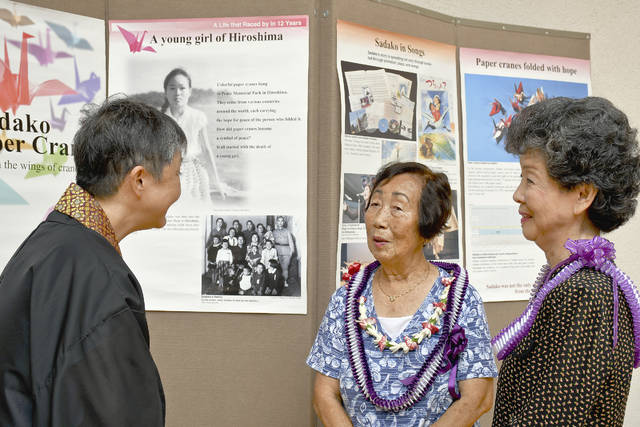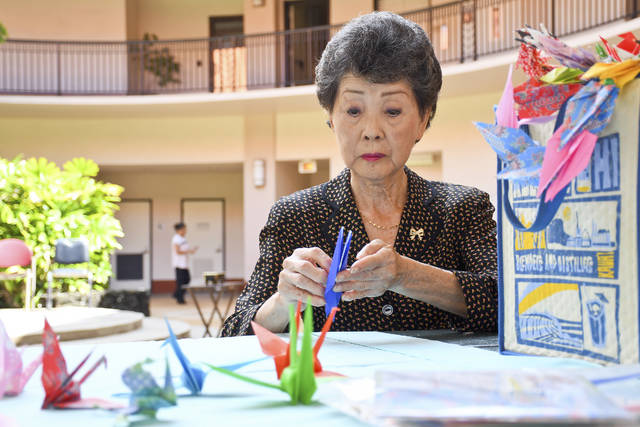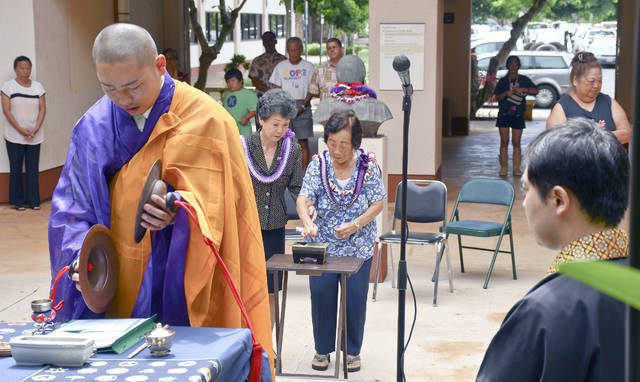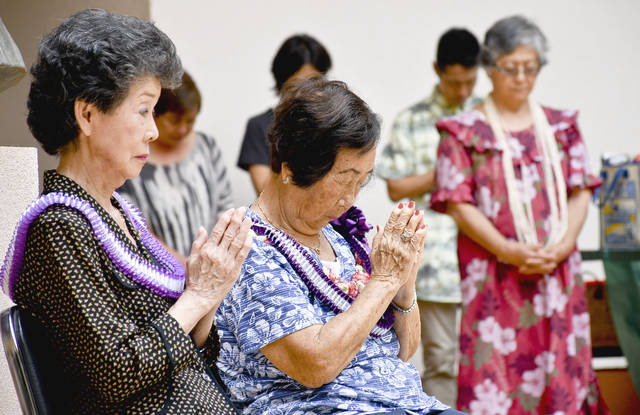LIHUE — On Aug. 6, 1945, at 8:15 a.m., Hiroko Kunioka’s grandmother was in Hiroshima with her nephew. That was when the United States dropped the atomic bomb on Hiroshima.
“I remember everything,” Kunioka said. “I was seven years old, and I remember all the smoke, and how tall it was, rising in the sky. My grandmother and nephew died because they were in Hiroshima. I was at home located on the outskirts of Hiroshima.”
Kunioka was among the guests to the Mokuto Shiki, or Silent Prayer Ceremony, on Monday at the Moikeha Building with several ministers from the different Buddhist churches officiating.
Mokuto Shiki is a traditional event held in Japan on the anniversary of the tragic events where people’s lives are lost, said Art Umezu of the Kauai Economic Development office.
“This is the first time we’re doing this service, and I believe there are no other counties where they stop to remember the impact of the atom bomb dropping,” he said.
They also offer mokuto shiki, or silent prayers, for victims of the recent flood disaster in Hiroshima, Okayama, Ehime, and other areas in southwestern Japan.
Kunioka was joined by Takako Decker, a survivor of the atomic bombing of Nagasaki on 11:02 a.m., Aug. 9, 1945.
“I really appreciate what the people of Kauai do for the victims in Hiroshima,” Kunioka said. “I watch, and I cry because I am so grateful.”
Decker said she was in high school when the bomb dropped on Nagasaki.
“I was 15 years old, and in high school,” she said. “It was the wartime, and I was called on to work in a factory outside of the town. That is the reason I survived. The factory was five, or six miles away from where the bomb dropped.”
Rev. Kohtoku Hirao of the Waimea Shingon Mission officiated over the mokuto shiki ceremony where the bombing survivors were given the opportunity to offer incense in memory of the victims.
“Here in Hawaii, there were many people who came from Hiroshima and Nagasaki,” Hirao said. “That means our ancestors’ family or friends might have been in Hiroshima or Nagasaki when the atomic bomb was dropped — so many precious human lives were lost by the first atomic bombing in human history.”
The total number of deaths estimated from the Hiroshima bombing was about 150,000 and from the Nagasaki bombing about 75,000. Some reports have higher total fatalities and some, lower.
Janine Rapozo of the county’s human resource office was one of the people in attendance, noting that she had traveled with the Kauai Yankees youth baseball team to Hiroshima on a goodwill baseball trip.
“We got to see the Peace Park and the museum,” Rapozo said. “Unfortunately, parts of the museum were closed, but I could see the impact the exhibits had on the kids. I’m glad we’re doing this.”
The ceremony was enhanced by a display on Hiroshima provided and the effects of the atomic bomb, including the story of Sadako and her battle against leukemia caused by the bombing.
“Nuclear weapon is not just a weapon,” Hirao said. “Nuclear weapons are a threat to peace. The radioactivity created by an atomic bomb causes radiation damage. There was black rain following the Hiroshima bombing. The black rain is called fallout and is an aftereffect of a nuclear explosion. The victims taught us a lesson on what atomic bomb brings. Atomic bombs must not be used again. Never again.”
Umezu said Mokuto Shiki is a vehicle for world peace, and invited guests to fold orizuru, or paper cranes that symbolize peace in Japan. These paper cranes created with the help of the Kauai Japanese Cultural Society will be displayed at this year’s Matsuri Kauai festival on Sept. 22.
“We are gathering here,” Hirao said. “Kauai is the place in the United States nearest to Japan, and we are offering a moment of silence for Japan from here.”
•••
Dennis Fujimoto, staff writer and photographer, can be reached at 245-0453 or dfujimoto@thegardenisland.com.





